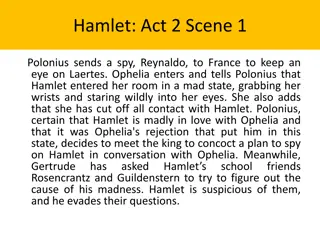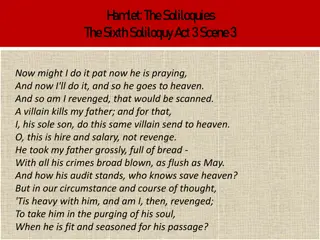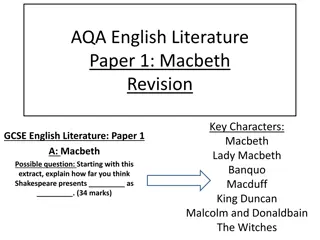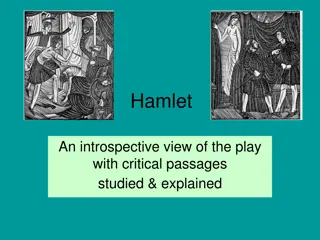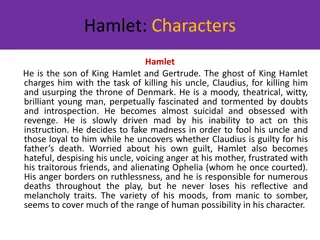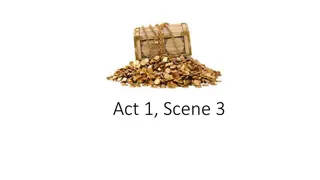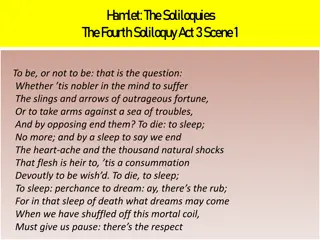Exploring Themes and Characters in Shakespeare's "Hamlet
Delve into the themes of revenge and tragedy in Shakespeare's "Hamlet" through an analysis of key scenes, characters, and language techniques. Explore the consequences of revenge, character motivations, and the atmospheric contrasts between scenes. Uncover the intricacies of the opening scenes, character dynamics, and the profound effects of seeking vengeance in this iconic play.
Download Presentation

Please find below an Image/Link to download the presentation.
The content on the website is provided AS IS for your information and personal use only. It may not be sold, licensed, or shared on other websites without obtaining consent from the author. Download presentation by click this link. If you encounter any issues during the download, it is possible that the publisher has removed the file from their server.
E N D
Presentation Transcript
Hamlet https://www.youtube.com/watch?v=AS6maTSY uPI
Predictions Characters What do you think the story is about? What do you think happens? Use the characters and captions to help you devise some sort of storyline. Captions
Hamlet Shakespeare A Revenge Tragedy Compare with The Revenger s Tragedy I hour 15 mins paper Closed Text
What are the side effects of revenge? What happens to someone as a result of revenge? What about the people around them? Is it self destructive? Why? Who gets hurt? REVENGE
The Characters Stick each character onto a separate sheet. We will be adding key quotes and characteristics as we go along. Alternatively, on the blog is a link to a document containing all the pics. You can use this too if you prefer.
The Opening Scene Act 1 Scene 1 What is the mood and atmosphere? What language techniques have been used to create this atmosphere? Look at the purpose of the ghost here. Does the ghost foreshadow anything? What is the ghost s attire? What is the purpose of this scene and what has it been used to establish? Also, explore what Horatio brings to the scene?
Act 1 Scene 2 Claudius Addresses the Court Objective: Understand the difference in the atmosphere between the first two scenes of the play Success Criteria: - Have compared the first two scenes - Completed a comparative analysis
How has Shakespeare shown a contrast in the atmosphere between Act 1 scene 1 and Act 1 scene 2? This is what we should be able to effectively answer by the end of the lesson.
Act 1 Scene 2 Scene 2 is set in the Great Castle of Elsinore. It is bright, colourful and loud. What are the key points of this scene? -
Claudius brother s death/Our state to be disjoint By our late dear The first scene hints at the widespread concerns that exist in Denmark, but this scene reveals exactly how rotten the state is. Claudius corruption is a sign that Elsinore is vulnerable.
Claudius First impressions Add key characteristics to your Claudius page. Include key quotes -Gertrude -Hamlet - Denmark
Hamlet sullied flesh would melt Shakespeare reveals Hamlet s thoughtful personality through his analysis of grief and his struggle with the morality of suicide. Hamlet's loss of faith and the question of whether suicide can be justified are major themes throughout the rest of the play. O that this too too
Hamlet the solitary thinker How has Shakespeare presented Hamlet? - Appearance - Attitude - What other s say to him
How has Shakespeare shown a contrast in the Atmosphere atmosphere between Act 1 scene 1 and Act 1 scene 2?
Character mapping Who are the characters and how are they linked?
Claudius Speech What s really happening in Claudius speech?
Act 1 Scenes 3 and 4 Ophelia s relationship with Hamlet is a major subplot Objective: Explore the character of Ophelia and her position in the play. Success Criteria: - Have started the character map for Polonius, Laertes and Ophelia - Have written a comparison between the inside and outside of the castle
Compare the two families: Claudius Polonius Gertrude Laertes Hamlet Ophelia Look at how the members of the family react and respond to the respective heads of the family, Claudius and Polonius. Can you sense any genuine love or concern in either family?
Polonius, Laertes and Ophelia Start the character pages for the above three characters. - Polonius's language and wordplay - Laertes language when speaking to Ophelia - Ophelia s submissiveness
Homework: - Scene 4 - the Danish custom of drinking - Why Hamlet is not afraid to go with the Ghost - Scene 5 How the Ghost compares himself to Gertrude and Claudius What does he say about his murder What does he say about how quickly he was killed
The ghost in Hamlet no doubt performs an important dramatic function. Whatever may have been Shakespeare's belief about ghosts he utilizes the popular conception to highlight what is in the minds of his characters. The ghosts or witches that appeared to Macbeth spoke out only what was in his mind, and revealed his inner thoughts to the audience better than any words of his could do. In the same way, the ghost in Hamlet discloses to us the suspicions already in the minds of Hamlet and his friends. When Hamlet sees the ghost and hears its revelations, he voices this thought by saying, "Oh my prophetic soul!" (I. V. 40.) And the fact that it first appears to the friends of Hamlet suggests that they shared his suspicions and perhaps even anticipated them, though no word had been spoken. The inquiry of Marcellus about the cause of the warlike activity and his later remark about the rotten condition of Denmark seem to imply a suspicion that he is endeavoring to verify or to disprove.
The scepticism that all at first show concerning the ghost seems to indicate their unwillingness to put faith in their suspicions. They do not willingly think evil of the king, and they all want some undoubted proof, not only of the fact of the ghost's appearance, but of the truth of his words. Horatio hesitates to take ths word of Bernardo and Francisco, and is convinced only by the actual sight of the ghost. Hamlet, apparently the least suspicious of all, for he is the last to see the ghost, seems reluctant to believe that Horatio and the others have seen it. To convince him, Horatio assures him with an oath of the truth of his report, saying, "As I do live, my honor'd lord, 'tis true." (I. ii. 221.) His doubts are not finally removed until the fourth scene when he sees the ghost for himself. At last, the evidence overcomes his moral reluctance to believe such foul suspicions, and Hamlet is convinced of the guilt of the king
Madness Revenge Act 1 Scene 5 Memory Complete the three sections looking closely at Act 1 Sc 5.
Add to the Ophelia character page, this time including quotes from the men who seem to be demanding her to act or do certain things. Write the name of the character after the quote. Ophelia and the status of women Unlike some of Shakespeare s other female characters (Juliet), Ophelia is not a developed character. She gives into the demands from the men in her life.
The Ghost appears to Hamlet This mirrors the first scene. There is a contrast between the carefree nature inside the castle and the looming threat outside.
How does Shakespeare show a contrast in this scene between the carefree nature of the court inside and the danger that is looming outside of the castle? Suspense before the ghost arrives - The sound of the trumpets - The feeling of both the old king and new king - What is further revealed about the state of Denmark -
Hamlet I do not set my life at a pin s fee For homework, add to your HAMLET character map. This time focus on how Hamlet is in a desperate state he does not care about his life. Also look at his references to fate and destiny.
A Few Weeks Later Act2 Scene1 1. Polonius sends someone to spy on his son, Laertes 2. Ophelia reports Hamlet s strange appearance
Polonius making Polonius appear ludicrous. Shakespeare lightens the tone by Full of his own importance and intoxicated words , he has the tendency to lose the thread of what was I about to say?/by the mass I was about to say something.
Hamlet begins to appear mad As if he had been loosed out of hell What do we learn from Ophelia about Hamlet s appearance? (83-90)
Key Info Hamlet knows Ophelia will tell her father what she has seen . Feminist critics comment that Ophelia seems to have no scope for following her own wishes. Others, contrasting her with Juliet, accuse her of a complete lack of spirit.
Deception is widespread Real Madness Vs Fake Madness Humour in Hamlet s Madness Players have an important role Hamlet curses his lack of action
Deception Using Act 2 Scene 2 as a starting point, analyse the importance of deception in Hamlet
The dramatic purpose of this episode is to establish Hamlet as a characteristically detached, reflective, analytic, thinking and moral. to be or not to be Hamlet s most unique soliloquy Abstract reflection.
Act 3 Scene 1 to be or not to be Read through the scene and work through the following steps: What are the key messages of this soliloquy? 2. Why is there no mention of the ghost/Claudius/Gertrude? 3. What do you notice about the tone and tempo? 4. What does this show you about Hamlet s state of mind? 1.
The calmness of the soliloquy is in direct contrast to the passionate exchange which follows Nunnery episode Get thee to a nunnery
Reversal of Roles Reversal of Roles - Gertrude s allegiance -Ophelia s betrayal EXPLORE Hamlet s reaction to Ophelia before she speaks. - How he refers to her - Language used Hamlet s rage once Ophelia starts talking. - How does he refer to her now? - Language he uses
The Mousetrap Play within a Play What are the key moments of the scene?
Claudius reaction to the play What does Hamlet think? Horatio .the voice of reason?
Hamlets relationships are developed Gertrude Horatio Rosencrantz And Guildenstern Ophelia
Ophelia should be viewed as a completely innocent victim Argue for AND against this statement for against
Act 3 Scene 3 Act 3 Scene 3 What does this scene reveal about Claudius character?
Repentance How do we know this? Claudius is not genuinely repentant
Tragi c Flaw Conscience Potential Explanations for Hamlet s Hamlet s Delay delay . Plot Device Fairness
Act 3 Scene 4 The Closet Scene What is the purpose behind Hamlet s confrontation? Confirms Claudius Guilt Make Gertrude repent Repair their relationship
Explore Gertrudes language whilst she is talking to Hamlet
Hamlets control Explore Hamlet s control over the conversation. How does he do this?
What do we make of Hamlets spontaneous reaction?


